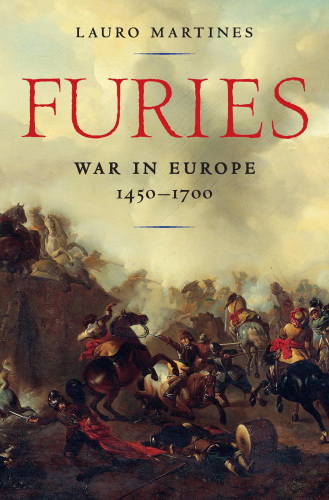
Furies
War in Europe, 1450–1700
کتاب های مرتبط
- اطلاعات
- نقد و بررسی
- دیدگاه کاربران
نقد و بررسی

October 22, 2012
Martines (Fire in the City), best known for his work on the Italian Renaissance, makes a major contribution in this survey of war in “early modern Europe.” Challenging the conventional emphasis on diplomacy, bureaucracy, and technology in most military histories addressing the period, Martines describes medieval Europe’s wars as having been shaped by a Christianity that saw battle “as punishment for sin”; a Protestant Reformation that justified “killing for God”; and a quest for private gain that drove poorly paid and insufficiently supplied armies to wreak havoc on civilian populations. The sacking of cities was not uncommon even if negotiations had been formally arranged, and mutually miserable groups of soldiers and peasants destroyed settlements as they fought over the scarce resources of subsistence economies. As civil societies dissolved in the face of random and organized violence, “fragile, unruly” armies developed into a parasitic form of community whose numbers often dwarfed those of proper towns. The direct consequences of plunder and plague, Martines concludes, far outweighed any abstract economic stimulus generated by war. The burgeoning fiscal-military state, moreover, sustained war making by replicating armies’ behavior in drawing resources from their subjects by compulsion. The difference between monarchs and mercenaries, Martines shows, was merely a matter of degree. Agent: Kay McCauley, Aurous Inc.

October 1, 2012
Many historians of war focus on generals, rulers, and tactics. Martines (Fire in the City: Savonarola and the Struggle for the Renaissance Florence) seeks to diversify the study of war by chronicling the plight of the common people during wartime. Chapters devoted to the sacking of cities, plunder, sieges, arms, and soldiers vividly describe the starvation, disease, and brutality that soldiers and civilians faced during 250 years of war. Much of the book's descriptive power is due to its excellent case studies drawn from primary sources. Additionally, Martines intertwines a discussion of the economic realities of warfare into the narrative, showing that inadequate financing and logistical considerations often contributed to the harsh conditions. The religious aspects of the wars are addressed and considered but are downplayed in favor of secular elements. Furies closes with a thoughtful discussion of warfare in the context of the state in early-modern Europe. VERDICT Highly recommended for any reader seriously interested in the history of early-modern Europe.--RK
Copyright 2012 Library Journal, LLC Used with permission.

























دیدگاه کاربران